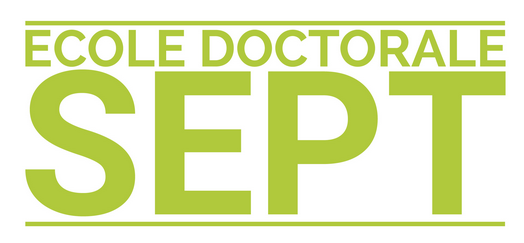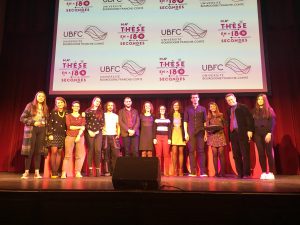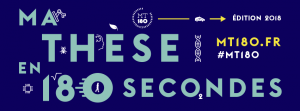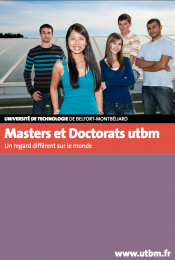et à l’Innovation (DREDI)
direction.recherche@utbm.fr
Fei GAO
Directeur
tél + 33(0)3 84 58 30 09
Caroline DELAMARCHE
Gestionnaire du bureau doctoral
tél + 33(0)3 84 58 35 29
Fei GAO
Directeur
tél + 33(0)3 84 58 30 09
Caroline DELAMARCHE
Gestionnaire du bureau doctoral
tél + 33(0)3 84 58 35 29
Le doctorat, le diplôme universitaire le plus élevé, constitue une expérience professionnelle qui permet d’acquérir des compétences scientifiques de haut niveau et des compétences génériques valorisables dans des métiers à responsabilité dans tous les secteurs socio- économiques. Il correspond à la conduite d’un projet de recherche original et innovant d’une part, et à un Plan Individuel de Formations continues en appui du projet de recherche et du projet professionnel du doctorant d’autre part.
La formation doctorale se déroule dans une École Doctorale accréditée d’UBFC pour le contrat 2017-2023. Chacune des ED accréditées dans le cadre du contrat 2017-2023 s’engage à mettre en œuvre les programmes d’actions définis dans l’arrêté du 25 mai 2016 et en particulier les formations continues qui préparent les futurs docteurs à leur évolution professionnelle, et des actions favorisant la structuration de la recherche et la transdisciplinarité sur le site de chaque Établissement. Elle veillera à recruter les meilleur(e)s doctorant(e)s, au financement de la thèse (salaire et fonctionnement), à son bon déroulement, à la valorisation des résultats acquis, et au soutien équitable des Unités labellisées.
Le règlement intérieur de chaque ED est public.
La formation comprend 100 heures de cours doctoraux minimum réparties en :
Liste et inscriptions aux cours sur la plateforme ADUM. Pour tout complément d’information, merci de contacter Mme Delamarche : formations.doctorales@utbm.fr
Pour plus d’informations, n’hésitez pas à vous rendre sur le site internet du collège doctoral de l’UBFC : http://collegedoctoral.ubfc.fr/doctorat-ubfc/
Le directeur de thèse et le responsable de l’école informent le candidat des ressources éventuelles pour la préparation de sa thèse (allocation ministérielle de recherche, allocation de recherche régionale, financement industriel, financement associatif …). La recherche effective d’un financement est nécessaire à l’inscription en thèse.
Les différentes démarches faites par les acteurs sont inscrites sur le formulaire d’inscription. Les moyens à mettre en œuvre pour faciliter l’insertion professionnelle reposent aussi sur la clarté des engagements du doctorant.
Le doctorant se conforme au règlement de l’école doctorale à laquelle il appartient et notamment suit les enseignements, conférences et séminaires.
Afin d’élargir son champ de compétence scientifique, des formations complémentaires en relation avec son insertion professionnelle lui sont suggérées par son directeur de thèse et le responsable de l’équipe de recherche. Ces formations, qui font l’objet d’une attestation du directeur de l’école doctorale, élargissent son horizon disciplinaire et facilitent sa future insertion professionnelle. Parallèlement, il incombe au doctorant, en s’appuyant sur l’école doctorale et sur l’établissement, de se préoccuper de cette insertion en prenant contact avec d’éventuels futurs employeurs (équipes de recherche, universités, entreprises, en France ou à l’étranger).
Le responsable de l’équipe de recherche et le directeur de thèse mettent tout en œuvre pour faciliter et encourager la participation du doctorant aux formations proposées par les écoles doctorales.
Cette stratégie peut inclure la participation aux journées doctorales. Selon les disciplines et les équipes de recherche, cet éventail de formations complémentaires peut utilement inclure un séjour en entreprise de quelques semaines. La participation des doctorants aux séminaires et réunions scientifiques nationales et internationales, quelle que soit leur localisation, et la présentation par les intéressés des travaux issus de leur recherche sont encouragées et facilitées. Les doctorants qui envisagent une insertion professionnelle dans l’enseignement se voient proposer une formation spécifique, une participation aux tâches d’enseignement et un soutien à la préparation des dossiers de candidature aux fonctions d’enseignement (ATER, maître de conférences…).
L’inscription en thèse précise le sujet, le contexte de la thèse et l’unité d’accueil. Le sujet de thèse conduit à la réalisation d’un travail à la fois original et formateur, dont la faisabilité s’inscrit dans le délai prévu.
Le choix du sujet de thèse repose sur l’accord entre le doctorant, le directeur de thèse, en accord avec le responsable de l’équipe de recherche, formalisé au moment de l’inscription. Le directeur de thèse, sollicité en raison d’une maîtrise reconnue du champ de recherche concerné, aide le doctorant à dégager le caractère novateur dans le contexte scientifique et s’assure de son actualité ; il s’assure également que le doctorant fait preuve d’esprit d’innovation.
Le directeur de thèse définit et rassemble les moyens à mettre en œuvre pour permettre la réalisation du travail. A cet effet, le doctorant est pleinement intégré dans son unité ou laboratoire d’accueil, où il a accès aux mêmes facilités que les chercheurs titulaires pour accomplir son travail de recherche (équipements, moyens notamment informatiques, documentation, encadrement technique). Le directeur et les membres de l’équipe de recherche exigent du doctorant le respect d’un certain nombre de règles relatives à la vie collective qu’eux-mêmes partagent et à la déontologie scientifique. Le directeur de l’unité de recherche peut, le cas échéant, faire signer un engagement de confidentialité et/ou de respect du secret médical au doctorant. On ne peut imposer au doctorant des activités nuisibles à l’avancement de sa thèse.
Le doctorant s’engage sur un temps et un rythme de travail. Il a vis-à-vis de son directeur de thèse un devoir d’information quant aux difficultés rencontrées et à l’avancement de sa thèse. Il doit faire preuve d’initiative dans la conduite de sa recherche.
La qualité et l’impact de la thèse se mesurent à travers les publications ou les brevets et rapports industriels qui seront tirés du travail, qu’il s’agisse de la thèse elle-même ou d’articles réalisés pendant ou après la préparation du manuscrit. La rédaction de publications fait partie intégrante du travail de recherche. Le doctorant doit apparaître parmi les coauteurs. L’ordre des coauteurs d’une communication à un congrès ou un séminaire et des publications doit refléter le travail fourni par chaque auteur.
A l’issue des trois années, l’étudiant rédige un rapport conséquent sur ses travaux de recherche appelé thèse. Le directeur de thèse propose, en concertation avec le doctorant, au président de l’université par l’intermédiaire du responsable de l’école ou de la formation doctorale, la composition du jury de soutenance dans le respect de la réglementation officielle et des recommandations prises par chaque école doctorale, ainsi que la date de soutenance. L’admission est prononcée, après délibération du jury. Aucune note n’est délivrée. La thèse de doctorat est sanctionnée par un diplôme national. Le postulant obtient donc le grade de docteur.
L’UTBM est co-accréditée avec l’Université de Franche-Comté pour délivrer le diplôme de docteur au sein de deux Ecoles Doctorales :
Directeur : André DIDIERJEAN
Adresse : ED SEPT, Maison des Sciences, de l’Homme et de l’Environnement, 1 rue Charles Nodier 25000 Besançon
Site web

1° le primat de l’interdisciplinarité, et non seulement de la pluridisciplinarité, au sens où elle soutient particulièrement les projets construits grâce à une collaboration active de chercheurs appartenant à des champs disciplinaires distincts, qu’il s’agisse de champs internes à ses propres unités de recherche ou de disciplines relevant d’autres écoles doctorales ou d’autres domaines de recherche (sciences formelles, sciences de la nature, sciences médicales, sciences juridiques, littératures, etc.). Cette orientation interdisciplinaire, évidemment non-exclusive, est accordée à la relation essentielle qu’entretient l’École avec les deux Maisons des Sciences de l’Homme de la Région (MSH de Dijon et MSHE de Besançon), dont le projet scientifique est justement commandé par l’interdisciplinarité.
2° la dimension à la fois stratégique et applicative de la recherche en SHS. Plusieurs unités de recherche accueillies au sein de l’École développent des recherches qui portent sur l’analyse des choix et décisions collectives effectuées aussi bien dans l’activité de recherche elle-même que dans ses applications ou ses conséquences au monde économique, social ou culturel, par exemple dans l’urbanisme, la consommation alimentaire, la production industrielle, l’éthique médicale, l’éthique environnementale…
3° l’ouverture internationale et inter-régionale. La volonté d’ouverture et d’échange qui caractérise notre École s’exprime par le montage de projets internationaux et inter-régionaux, en collaboration avec les autres Écoles doctorales au sein de la Fédération des ED SHS et plus largement au sein de la COMUE UBFC, la coopération des Maisons des sciences de l’homme, collaboration déjà engagée avec les universités de Tsukuba (Japon), Mayence (Allemagne), Ljubiana (Slovénie), les Universités de Suisse romande, de Roumanie et du Maghreb…
Directeur UFC : Thérèse LEBLOIS
Directeur adjoint à l’uB : El-Bay Bourennane
Adresse : ED SPIM, 32 avenue de l’Observatoire 25000 Besançon
Contact : ed-spim@univ-fcomte.fr
Site web : http://spim.ubfc.fr

Son potentiel d’encadrement doctoral s’élève à plus de 260 chercheurs ou enseignants/chercheurs habilités à diriger des recherches (HDR) répartis dans des unités de recherches contractuelles des établissements. Près de 400 doctorants y travaillent répartis dans les 3 années normales du cycle de formation. Ils sont répartis sur 9 villes de Bourgogne Franche-Comté : Besançon, Belfort, Dijon, Montbéliard, Nevers, Sévenans, Le Creusot, Auxerre, Chalon-sur-Saône. Elle délivre en moyenne 100 diplômes de doctorat par an.
Son objectif est de proposer à ses doctorants une formation de qualité à la recherche et par la recherche et de les aider dans la préparation de leur avenir professionnel. S’appuyant sur les activités de 8 unités de recherche (FEMTO-ST, ImVIA, ICB, LIB, DRIVE, CIAD, NIT, ELLIAD), l’Ecole Doctorale SPIM offre un cadre particulièrement riche et propice à la recherche. Elle concentre les recherches dans les domaines des systèmes optiques et électroniques, mécaniques et énergétiques, des matériaux, de l’automatique, de l’informatique. L’accent est mis particulièrement sur les secteurs de pointe des microtechniques et reconnus internationalement : matériaux avancés, structures intelligentes, ondes.
L’inscription en thèse n’est possible que dans la mesure où l’Ecole Doctorale est assurée de son financement quel que soit sa nature. Les plus courants sont les suivants :
Les CIFRE sont gérées et animées par l’Association Nationale de la Recherche Technique (ANRT) pour le compte du ministère de l’Education Nationale de l’Enseignement et de la Recherche.
Pendant les trois ans que dure la Convention, l’entreprise perçoit une subvention forfaitaire annuelle que lui verse l’ANRT.
L’événement sera transmis en direct sur mt180.fr et sur la page Facebook UBFC.
Lundi 19 mars 2018, se tenait à Besançon, la finale régionale du concours “Ma thèse en 180 secondes”, organisée par la Conférence des présidents d’université et le CNRS.
10 candidats issus de toute la région devait tour à tour présenter en trois minutes un exposé concis, clair et convaincant sur leur projet de recherche.
L’UTBM était représentée par 3 doctorants : Lucille DESPRES (équipe PMDM-ICB), Alicia ANNOVAZZI (équipe PMDM-ICB) et Jérémy DECERLE (équipe O2S-NIT)
Lucille Despres a reçu le 2ème prix du public avec sa thèse : “Mécanismes d’endommagement des barrières thermiques sous environnement riche en CMAS”.
Vendredi 6 avril, Lucille a participé à la demi finale nationale organisée à Paris. L’aventure s’est arrêtée pour elle ici, non sans avoir démérité. Bravo!


Inspiré du concours Three minute thesis, qui a eu lieu pour la première fois en 2008 en Australie, le concours Ma thèse en 180 secondes (MT180) permet à des doctorants de présenter leur sujet de recherche de façon vulgarisée, devant un public novice et diversifié.
Il s’agit de faire un exposé clair, concis et surtout convaincant autour de votre projet de recherche, le tout en 3 minutes !
Les participants doivent satisfaire aux conditions d’admissibilité suivantes :
représenter le pays dans lequel ils ont été sélectionnés pour la finale internationale
Toute l’année, vous pouvez envoyer une candidature spontanée (envoi d’un CV et d’une lettre de motivation) à direction.recherche@utbm.fr.
L’UTBM délivre des doctorats dans 13 spécialités:
Sujets proposés |
Contacts(pour l’envoi de votre candidature) |
